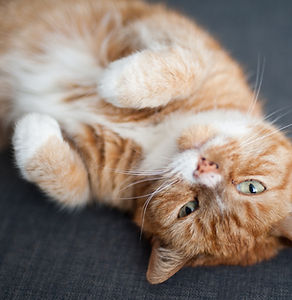
How Can We Help with Feline Behavior Conditions
Cats are known for their independent nature, but when behavioral issues arise, they can be a source of concern for both owners and their beloved pets. Whether your cat is exhibiting aggressive tendencies, becoming overly anxious, or suddenly avoiding interaction, these behaviors can often be linked to underlying health issues or emotional distress. Fortunately, Dr. Love can play a crucial role in diagnosing and managing feline behavior conditions, offering guidance and solutions that lead to a happier, healthier cat.
1. Understanding feline Behavior problems
Feline behavior issues may manifest in various ways, such as:
● Aggression: This can include biting, scratching, or attacking both people and other animals.
● Inappropriate elimination: Cats may urinate or defecate outside of the litter box, which could be a sign of stress, medical conditions, or environmental changes.
● Excessive vocalization: Unusual meowing or yowling can indicate anxiety, boredom, or even pain.
● Destructive behavior: Scratching furniture, chewing on wires, or knocking things over may be a response to stress, boredom, or an unmet need for stimulation.
● Litter box issues: Refusal to use the litter box or inappropriate elimination might signal urinary tract infections, bladder stones, or anxiety.
When faced with any of these behavioral issues, it's essential to seek professional help. Veterinarians are not only skilled at treating physical ailments but are also equipped to assess and address behavioral concerns.
2. How can we help
1. Medical Evaluation
Many behavioral issues stem from medical conditions. Cats are experts at hiding
discomfort, so a sudden change in behavior could indicate an underlying health problem. For example:
○ Pain: Arthritis, dental issues, or injuries can make a cat irritable and more prone to aggression or withdrawal.
○ Urinary tract infections or bladder conditions: These conditions can cause your cat to urinate outside the litter box.
○ Hyperthyroidism: This condition can lead to excessive vocalization, restlessness, or destructive behavior.
A thorough veterinary examination, including diagnostic tests like blood work or imaging, can help rule out or confirm any health problems contributing to your cat's behavior. Once any medical issues are addressed, many behavioral problems improve or resolve entirely.
2. Behavioral Assessment and Diagnosis
Feline Specialists are trained in feline behavior and can conduct a behavioral assessment to help identify the root cause of your cat’s behavior. This involves gathering information about the cat’s history, environment, and lifestyle. Is the cat stressed by recent changes in the home? Does the cat experience separation anxiety when left alone? Is there an issue with the litter box that’s causing discomfort?
Through detailed questioning and observation, your veterinarian can determine whether the problem is behavioral, environmental, or medical. They may confer with a veterinary behaviorist—a specialist in animal behavior—if the case requires advanced intervention.
3. Creating a Customized Treatment Plan
Once a diagnosis is made, we will work with you to create a tailored treatment plan. This
could include:
○ Behavioral modification: Implementing strategies like positive reinforcement, training, and environmental enrichment to address undesirable behaviors.
○ Medication: In some cases, we may prescribe medication to help manage anxiety, aggression, or other behavioral issues. These medications can help your cat feel more comfortable and responsive to behavior modification techniques.
○ Environmental adjustments: Suggestions may include adding more resources like cat trees, scratching posts, and toys, or making changes to reduce stressors such as loud noises, changes in routine, or conflict with other pets.
4. Ongoing Support and Monitoring
Behavioral issues in cats often require ongoing monitoring and adjustments. We always
schedule follow-up visits to assess your cat’s progress and make any necessary changes to the treatment plan as behavioral changes often take weeks to months to improve or resolve. Knowing these cats need time to get better, we can provide ongoing advice and encouragement, ensuring that your cat remains on the path to improvement.
3. The importance of early intervention
The sooner you address feline behavior issues, the better the outcome for your cat. Untreated behavioral problems can lead to more severe issues, including chronic stress, aggression, or the deterioration of the bond between you and your cat. Early intervention allows for effective treatment and prevention of long-term consequences.
We are a valuable resource when it comes to addressing feline behavior conditions. By taking a comprehensive approach that includes medical evaluation, behavioral analysis, and tailored treatment plans, Dr. Love can help you improve your cat's well-being and restore harmony in your home.
If you're concerned about your cat's behavior, don’t hesitate to schedule an appointment. Together, we can find the right solutions to ensure a happy and healthy life for your feline companion.



